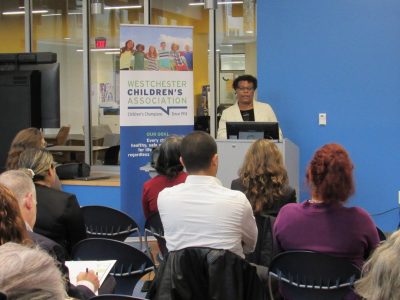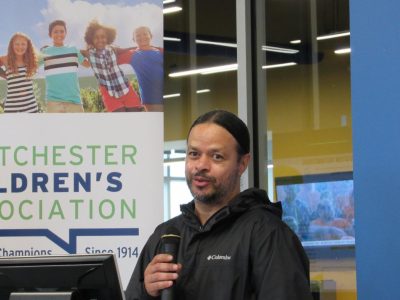Digital Divide Reveals Tech Disparities Along Racial Lines in Westchester
News Based on facts, either observed and verified directly by the reporter, or reported and verified from knowledgeable sources.

Low-income communities in Westchester, particularly people of color, are disproportionately harmed by having far less broadband access, a newly-published survey revealed.
The Westchester Children’s Association (WCA) partnered with Pace University to produce the “Digital Access Survey: Perceptions of Parents in K-12 Schools in Westchester County, New York.” The results were released at an Oct. 4 news conference hosted by Pace University in Pleasantville.
The survey was conducted both online and in person, tapping into community partners such as libraries, youth bureaus, family medical centers, and other organizations.
The survey asked how many students and families had access to electronic devices and internet options, possessed digital literacy, engaged in digital communication, and had experiences with remote learning. Using a wide variety of demographics, there were 511 responses from Westchester parents and guardians. Nearly three-quarters of respondents – 73 percent – completed the survey in English and 27 percent in Spanish.
The survey identifies a need for digital literacy training for families and students with English as a second language.
Glaring disparities in digital access surfaced during the pandemic when students needed online access for remote learning.
“Today we have lessons learned from the pandemic,” WCA Executive Director Allison Lake said as she addressed elected officials, students, and organizational directors filling the multipurpose room at the Kessel Student Center.
“The genie is not going back in the bottle, and there is work we have to do to include digital equity access and inclusion for all Westchester residents,” Lake added.
Raphael Ceara said he never owned or knew how to operate a computer until he took a class at the STEM Alliance, a Larchmont nonprofit organization that teaches STEM subjects and basic computer and technology skills.
“I learned simple things like getting e-mail and how to attach documents,” Ceara said. “I am very appreciative of the class.”
The WCA/Pace survey, authored by Sydney Moraitis, a graduate student working on her master’s in public administration, and Dr. Gina Scutelnicu-Todoran, a Pace associate professor, revealed that 31 percent of the respondents believed technology made their child’s learning more difficult and 27 percent experienced stress due to technology at least once a week.

According to the U.S. Census Bureau’s latest data, almost 25,000 households in Westchester County have no internet service, and nearly 14 percent of people making $75,000 or less do not have an internet subscription. The WCA/Pace survey found that 54 percent of participants spent between $50 and $99.99 per month on internet access.
“We know there are almost 90,000 low-income people here in Westchester County, and of those that completed the survey, only 1 percent knew about government-funded affordability programs for digital access,” Lake said. “We know that there is federal and state funding coming down the pike, and we want to position Westchester to be ready to take advantage of the new funding and the supports that are there.”
Lake said the newly-formed Digital Inclusion Coalition, which consists of the WCA, Pace, the STEM Alliance, and the Westchester Library Association, will be asking county officials to provide $125,000 in the 2023 Westchester County budget to establish a leadership position at the county level for digital equity, inclusion, and access.
“That person would support the coalition that has already been started and help plan a county-wide digital equity summit to have more people at the table,” she said.
Attending the news conference were county legislators MaryJane Shimsky (D-Dobbs Ferry) and Colin Smith (D-Peekskill) and staff members representing County Legislator Chris Johnson (D-Yonkers) and Assemblyman Chris Burdick (D-Bedford).
“This is one of the most critical things we are doing right now,” Shimsky said. “It’s very hard to look for a job or do a job without access to the internet or to see how well your children are doing at school without the internet. Increasingly the digital divide is what defines the rich from the poor.”

Abby is a local journalist who has reported on breaking news for more than 20 years. She currently covers community issues in The Examiner as a full-time reporter and has written for the paper since its inception in 2007. Read more from Abby’s editor-author bio here. Read Abbys’s archived work here: https://www.theexaminernews.com/author/ab-lub2019/
